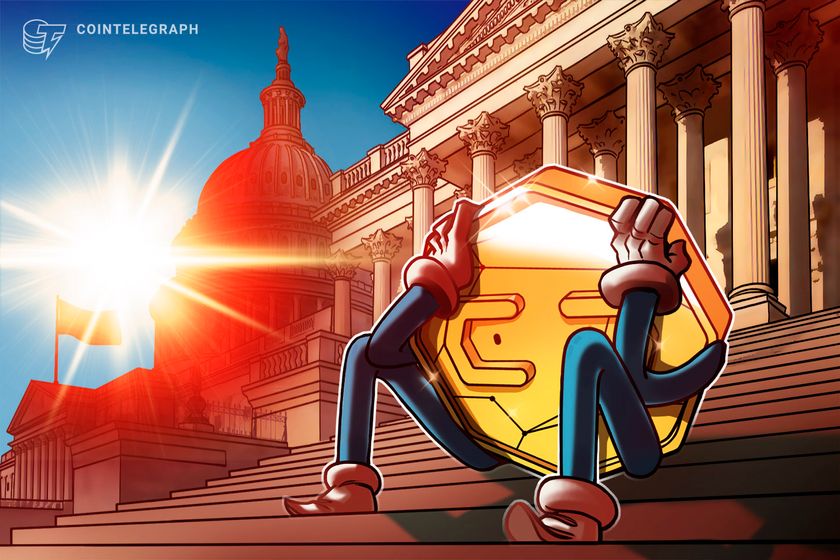

The crypto industry’s sway in Washington DC has made it more likely that the industry will get beneficial legislation, but it’s also creating problems.
Concerns of regulatory capture — a situation in which regulators or lawmakers are co-opted to serve the interests of a small constituency — have grown as crypto lobbying gains influence in Washington.
The risks of regulatory capture are twofold: First, the public interest is shut out from policy-making in favor of a single industry or company, and second, it can make regulators blind to or paralyzed by economic risks.
Now, not even three months into Trump’s presidency, American lawmakers and industry crypto observers have voiced concerns that this regulatory capture could not only negatively affect the country but curb competition within the crypto industry as well.
Regulatory capture in the battle for crypto policy
In a March 28 letter, prominent members of the US Senate Banking Committee and Committee on Finance addressed Acting Comptroller Rodney Hood and Michelle Bowman, Chair of the Federal Reserve Board of Governor’s Committee on Supervision and Regulation.
The letter specifically addresses the launch of USD1, a stablecoin project from the Trump family’s decentralized finance project World Liberty Financial (WLFI), as Congress considers GENIUS Act legislation on stablecoins.
Related: Trump’s crypto project launches stablecoin on BNB Chain, Ethereum
The senators suggest there are opportunities for regulatory capture and conflict of interest. “President Trump may review any actions the OCC takes with regard to USD1’s stablecoin application. He would be positioned to intervene in and deny the OCC from promulgating stablecoin safeguards, or force the agency to refrain from initiating any enforcement actions against WLF.”
Son Eric Trump pumps his father’s memecoin ahead of the inauguration. Source: Eric Trump
They added that he could attempt to intervene or deny assistance to USD1’s competitors and that the GENIUS Act provides no provisions to prevent such conduct.
Crypto industry observers have also echoed concern over a single entity’s undue influence over policy when it comes to Coinbase’s influence in Washington’s development of stablecoin policy.
In January, Coinbase CEO Brian Armstrong signaled that his firm would be willing to delist Tether (USDT), the world’s largest stablecoin, if the version of the stablecoin bill under consideration in Congress became law.
Under those terms, USDC, in which Coinbase is a major shareholder, would essentially be fencing out its largest competitor from the US market.
Castle Island Ventures partner Nic Carter cried foul, stating that “Regulatory capture is poison. Reminds me of what SBF used to do.”
Related: SBF always played both sides of the aisle despite new Republican plea
At the time, Vance Spencer, founder of crypto venture firm Framework Ventures, said that it was “a blatant attempt at regulatory capture by US players done at the expense of US national interest.”
“The future of stablecoins can be US dollar-based only if we allow a broader competitive set of stablecoin issuers to flourish and deny gatekeeping/gaslighting by those interested in regulatory capture,” he concluded.
George Selgin, senior fellow and director emeritus of the Cato Institute’s Center for Monetary and Financial Alternatives, told Cointelegraph that the Bitcoin reserve is another clear example of the crypto lobby’s influence over the regulatory process.
Trump signs the Bitcoin reserve executive order. Source: David Sacks
“It’s unlikely that anyone would have considered it desirable, let alone necessary, for the US government to maintain digital asset stashes — in fact, there’s no good reason for its doing so — had it not been for intense pressure from cryptocurrency enthusiasts,” he said.
Regulatory capture is old hat in Washington lawmaking
Different lobbies influencing policymaking in Washington are nothing new, so much so that “regulatory capture” to the layman would seem to describe business as usual.
Selgin said that the Biden administration’s approach to crypto was equally an example of regulatory capture, just in favor of traditional financial firms that, with their lobbying efforts, wished to limit competition from industry upstarts.
“Regulators’ relatively hostile stance toward crypto [under Biden] was no less evidence of regulatory capture than their more indulgent stance toward it today. The main difference was in who did the capturing,” he said.
“Financial regulatory capture is an old story; only some new players are now proving to be adept hunters.”
When asked how one would differentiate between legitimate industry advocacy and regulatory capture, Selgin said, “I don’t think you need to. First of all, the line between them is very thin.”
Industries rarely take complete control of regulators due in part to the fact that individual firms within an industry have different ideas about what ideal regulation looks like, said Selgin.
Furthermore, any kind of successful advocacy “‘captures’ regulators to some extent” if only by virtue of the fact that it makes them change their beliefs about how best to regulate.
What is to be done?
The question remains then: is regulatory capture just to be accepted as a natural part of the policymaking process?
Some academics have suggested creating entirely new government bodies to deal with the problem. Gerard Caprio, William Brough professor of economics, emeritus at Williams College, proposed the creation of an expert panel dubbed a “Sentinel” to oversee regulator behavior.
But such proposals face nearly impossible headwinds, not only because of their technical complexity, but due to the simple fact that lawmakers have no incentive to set up an organization that oversees them.
Related: Trump’s CFTC pick Brian Quintenz gets crypto’s foot in the revolving door
According to Selgin, the ultimate determination is not “whether or how the industry manages to influence regulators. It’s whether the resulting regulatory regime serves the public interest […] If a regulation is harmful, it’s harmful whether it was lobbied for or not.”
And the public’s interest in crypto is getting harder to see. Polls about crypto sentiment, trust and ownership vary wildly, and the Trump administration’s personal interest has done little to endear it to skeptics or middle-of-the-road voters.
Some industry surveys claim that a whopping 70% of Americans own crypto. Source: NFT Evening
Even crypto lobbyists admit that the (barely) bi-partisan drive for crypto is driven by a desire to appease the crypto industry’s deep pockets ahead of the 2026 midterms.
Dave Grimaldi, executive vice president of government relations at Blockchain Association, said, “There are […] pro-crypto candidates who won and were funded by our industry and had votes coming to them from crypto users in their district. […] And then there were also incumbent, sitting members of Congress who lost their seats because they were so negative for completely unnecessary and illogical reasons.”
Little can be done until lawmakers and regulators agree there is a problem to solve and exert the political will to solve it.
Magazine: Arbitrum co-founder skeptical of move to based and native rollups: Steven Goldfeder



